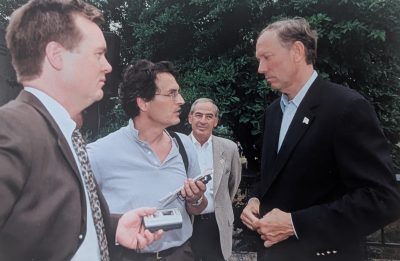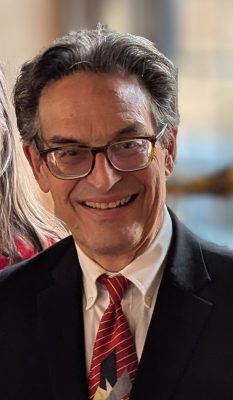The Watchdog Isn’t Done Yet: David McKay Wilson on Retirement and What Comes Next
News Based on facts, either observed and verified directly by the reporter, or reported and verified from knowledgeable sources.

By Adam Stone
When veteran local journalist David McKay Wilson walks into St. Mark’s Church in Mount Kisco, his family history surrounds him. His great-grandfather helped lead the congregation there more than a century ago, and Wilson himself now serves on the vestry.
That sense of service and civic engagement has defined Wilson’s reporting over the years — digging deep, uncovering hidden truths, and shining a spotlight on misconduct by public officials on behalf of a community of readers.
After almost 40 years as one of Westchester’s most relentless watchdog journalists, Wilson is stepping away from The Journal News/LoHud. At 72, he has accepted a buyout from Gannett, with his last day on Sept. 8. Wilson has not previously spoken publicly about the move, telling The Examiner this marks his first time sharing news publicly of his retirement.
But his work as a watchdog isn’t over just yet.
“Well,” the Carmel resident said in a phone interview earlier this morning, “I’m going to still do some writing. I’m still trying to figure out the venue for that.”
And while he might start a Substack or contribute to other publications, given LoHud’s place in local news — and the reach of his popular reporting-based Tax Watch column — his retirement marks a significant moment for accountability coverage in the region.
“I think journalism is really an essential part of our democracy,” he noted. “And I’ve seen the withering away of local journalism in Westchester County.”
Wilson’s retirement comes amid a continuing crisis in local journalism nationwide, with nearly 55 million Americans lacking meaningful access to local reporting, according to the 2024 Medill State of Local News Report. Yet there are bright spots: new nonprofit news organizations and other local initiatives are working to fill some of the gaps.
“There’s a hunger, certainly a hunger for local news,” Wilson said. “Many of them, though, are still, trying to find a financial model.”
From Nursing Student to the Newsroom
Wilson caught the journalism bug in college at Northeastern University, where he was originally studying nursing.
He began writing for the Northeastern News student paper, freelancing on the side for the Boston Globe and the Boston Phoenix.
“And after a year and a half in nursing, I decided, you know what, I really like journalism,” he recalled. He switched majors and graduated in 1978 with a degree in journalism.
As a rookie reporter, he covered Cambridge City Hall. He then headed to New Haven to write for the alternative weekly New Haven Advocate and freelanced for the Globe’s New England section and The New York Times’ Connecticut section.
Returning to Westchester
The meat of his career started in 1986, when Wilson returned to his family’s Westchester roots.
Although he grew up in Granby, Connecticut, his great-grandfather had come to Mount Kisco in 1890 as minister at St. Mark’s. The family later settled in Yonkers, where Wilson’s father grew up.
Wilson arrived in White Plains in 1986 to cover City Hall, at a time when homelessness gripped the city.
“I wrote extensively about the homeless crisis and housing,” he said. “And writing about housing is something that I’ve written about through the entire 40 years. In fact, the last couple weeks, I’ve been back in White Plains writing about housing with [developer] Louis Cappelli and the Galleria Project.”
Housing coverage became a throughline of his career, even as he tackled a wide array of subjects, including the federal housing desegregation case when Rob Astorino was county executive of Westchester.
“I wrote about the resistance extensively in Chappaqua, in New Castle, with the Chappaqua Station project,” Wilson said. “The federal housing monitor quoted my stories in a number of his submissions … what we found in New Castle and Harrison was instrumental in helping get those units built and occupied.”

Tough Reporting and Local Impact
Hard-hitting coverage of public officials has long been Wilson’s hallmark. He made especially large waves in Carmel, with reporting that culminated in a 2021 story: “Carmel Councilman Mike Barile charged with theft of services for illegal town sewer hook-up.”
“I uncovered his illegal sewer hookup to his restaurant, leading to his conviction for stealing the sewer services from the town and a $105,000 fine,” Wilson said.
He left Gannett in 2007 to pursue freelance writing, producing articles for alumni magazines and professional newsletters while also founding a nonprofit focused on bike and pedestrian safety. In 2009, he ran unsuccessfully for town supervisor of Carmel as a Democrat, before returning to The Journal News in 2012.
Asked how he responds to criticism that his coverage his colored by his politics, Wilson said he maintains transparency and professionalism.
“My hallmark is always to be fair,” he said. “And I think people have come to see that. … I’m critical of both Republicans and Democrats. You can certainly see that’s my record.”
Even beyond his own reporting, Wilson has been outspoken about press freedom.
In 2023, when Republican Congressman Mike Lawler initially banned the press from his town halls, Wilson pushed back.
“We reported on that,” he said. “And Lawler subsequently dropped his ban on the press. I thought that was very important to stand up for the First Amendment, as it was under attack.”
What Comes Next
Though he plans to keep writing, “retirement” won’t be all work.
The father of two adult children co-hosts a monthly ballroom dance program through his church. And he’s channeling creativity into public art: his Stars of Hope project will bring 30 large, five-foot-high wooden stars adorned with holiday lights to the Winter Wonderland exhibit at the Kensico Park Dam, brightening trees (and spirits) this winter.
But journalism, that “essential part of our democracy,” as he put it, still stirs his soul.
“It’s how people learn about what’s going on in their communities,” he observed. “It can uncover things a government is doing that may not be proper and can bring change that way.”
Even as Wilson steps back from the Gannett newsroom, he’s still finding ways to shine a light on the local community — literally and figuratively.

Adam has worked in the local news industry for the past two decades in Westchester County and the broader Hudson Valley. Read more from Adam’s author bio here.
